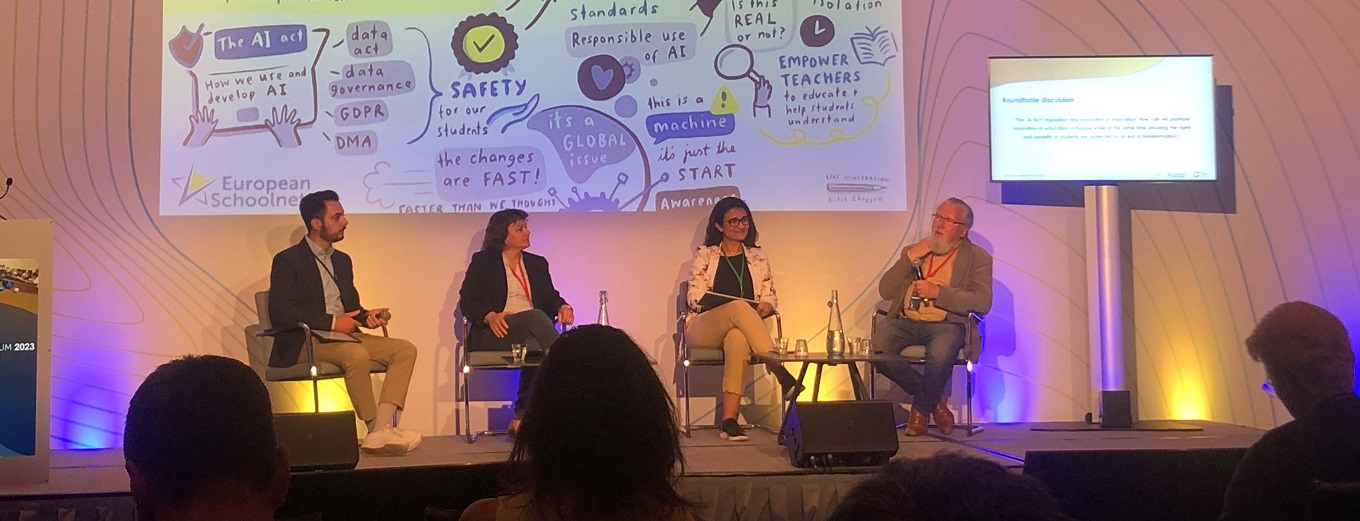How to deal with AI in the classroom? Is there a need for regulation? These and further questions were discussed during the School Innovation Forum 2023.
The 2023 edition of the School Innovation Forum took place on 6-7 June in Brussels with the guiding theme “Innovating in times of transformation”. Over 130 education stakeholders came together to exchange on the current challenges and future opportunities of technology in education, including a Swiss delegation represented by Movetia and SwissCore. They had the chance to discuss with European and national policymakers, EdTech industry partners, education researchers and members of the academia.
Artificial Intelligence (AI) in education in particular was one of the hot topics of the conference, with different experts presenting risks, new possibilities and the need for better regulation. A critical perspective was adopted by Wayne Holmes, Associate Professor at the University College London (UCL), who pointed to the lack of scientific evidence on the benefits of the growing catalogue of EdTech solutions to ensure a knowledge base for policy makers as well as for an adapted pedagogical practice. One of the major problems of AI according to him is the fact that developers start with the technology and only see in a second step, how it can be applied in education.In addition, Holmes argued that technological solutions often only fix the surface of the issue he described as “symptoms” and not the complexity of a situation in the educational context.
The recurring topics of the correct application of AI in the classroom was also addressed by Inge Molnaar, Director of the National Education Lab AI in the Netherlands. She presented three ways to approach AI which are Learning with AI – Learning about AI – Learning disturbed by AI and enumerated a variety of new opportunities, such as personalisation of learning or increase in digital literacy, as well as risks, such as loss of teacher autonomy or reduction in student privacy and freedom. She also addressed the issue of educators’ uncertainty in terms of AI and recommended the introduction of a reference framework to ensure a common language in relation to AI and to understand its place and function in education. In this context, she presented a practical tool called the six levels of automation model illustrating the division of control between teacher, learner, and AI with full teacher control over the task on one side of the continuum and full automation through AI of the task on the other side.
In addition, a need for adapted regulation without restricting innovation in the context of the EU AI Act was debated during a panel discussion (see SwissCore article). Maria Gkountouma, EU Policy Assistant at DG EAC from the European Commission, referred to the underlying legal processes such as the Data-Act, the European Data Governance Act, the General Data Protection Regulation (GDPR) and the Digital Markets Act (DMA) aiming for the same goal in the educational landscape: students’ safety. The European Commission aims for two objectives in regard to the AI Act which are the possibility of a generic application and at the same time some space of maneuver allowing amendments or supplements to adapt to ongoing changes. Gkountouma also derived two accompanying challenges which are an unclear distinction of what is real and what is not and the issue of the digital divide and digital well-being. One of the main conclusions from the panel discussion was that teachers need to be empowered through re-skilling and upskilling, keeping in mind the remaining obstacles such as the lack of time and the decreasing attractiveness of the teaching profession.
Other themes like the importance of a multi-stakeholder approach, the state-of-play of EdTech in Europe and international networking between EdTech start-ups were addressed. EU policymakers Georgi Dimitrov, Head of Unit for Digital Education at DG EAC discussed the two proposals the Commission has put forward on the general readiness of schools to adapt to the digital age. The proposal for a Council Recommendation on key enabling factors for successful digital education (DEAD Action 1) and the proposal for a Council recommendation on improving the provision of digital skills in education and training (DEAP Action 10) are thereby part of the Digital Education Action Plan (DEAP). Furthermore, Schoolnet’s latest report, Accelerating EdTech Start-Ups in Europe, was presented with an overview of the EdTech start-ups landscape in Europe. Participants also got an insight into the European EdTech Map, an overview of the diversity of EdTech start-ups in Europe which are able to find like-minded partners for collaborations.
To conclude, the introduction of digital solutions in the classroom as a support for educational innovation and the development of vital digital skills for the future labour market was perceived as an important step for the digital transformation. However, this process should be carried out within a regulated framework to ensure the safety and well-being of all actors such as students, teachers or schools, and to prevent ethical, human right or data privacy abuses. A closer public-private cooperation is needed with sufficient monitoring mechanism, to which the work of the European Commission intends to contribute.

